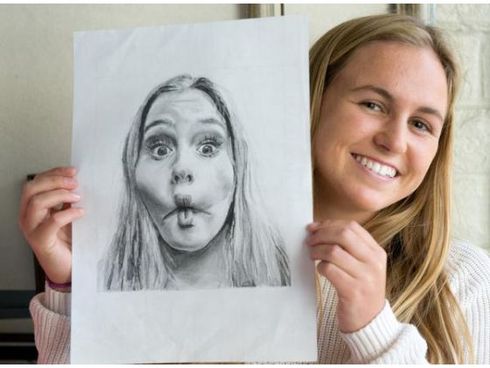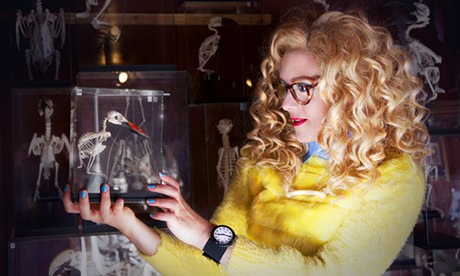Food for thought
Resources & Inspirational Stories on Mission Sisterhood Topics
The following is an interesting, "outside the box" approach that addresses many of the topics in MS. Fitting in at school, looking beyond the surface, breaking out of the clique stereotypes at school, meeting and making a diverse group of friends.

Drawing attention to others
BY KAITLIN WRIGHT / CONTRIBUTING WRITER OC Register
Published: Oct. 17, 2014 Updated: 4:49 p.m.
LEONARD ORTIZ , STAFF PHOTOGRAPHER
For Newport Harbor High School senior Emma Erickson, thinking about finishing high school and all the changes that would go along with it made her ponder what she could do to remember and cherish her last year.
As a result, Erickson, an International Baccalaureate visual arts student, began a project that involves creating a series of pencil-drawn portraits of students in the senior class. While the drawings on their own are beautifully executed, the most interesting facet of Erickson’s series lies in how the students are selected.
Inspired by the 1985 movie “The Breakfast Club, Erickson started the project by thinking of someone in her class whom she admired from afar but never got the chance to know. She then approached the classmate, explained the project and asked to take her photo so a pencil drawing could be completed.
Megan Moricca, Erickson’s first subject, was someone she had met in elementary school but had since lost contact with.
“We ended up in different social circles, and I always wanted to hang out but never did,” Erickson said.
Said Moricca: “When she told me she wanted to draw me, I took it as a really big compliment.”
Erickson said she admires Moricca because her personality is markedly different from her own.
“She’s proud and loud and really strong,” Erickson said. “The way she would react to something is totally different than the way I wouldErickson then asked Moricca to choose the next person in the series. Again, it had to be someone Morrica admired from afar but never actually became friends with. That student then chose the next.
As the pattern continues, each person is approached by Erickson. She asks to take a photo to complete the pencil drawing but doesn’t reveal the identity of the person who selected him or her.
“I just want them to be happy in the simple fact that someone out there admires them,” she said.
Erickson has titled her series “The Seating Chart,” and at the end of the year, she plans to invite all who are involved to meet, giving them an opportunity to hang out and get to know someone new.
Ellie Reid, another participant in Erickson’s project, said that because Newport Harbor is such a large school, she doesn’t know most of the student body. She expressed excitement about seeing the outcome of Erickson’s series, saying: “This project is bringing people together. It’s creating a bigger social base and friend group (that) we can rely on.
A second part of the project involves handwritten letters from the admirer to the person selected. This is Erickson’s favorite part because she thinks it will do people good to hear why someone thinks they are important. “Basically my letter (to Moricca) says thank you for being different, and thank you for being you,” Erickson said
Because Erickson asked participants to “show their personality” in their photos, each has a different facial expression. From these images Erickson hopes to display outwardly a little of what each student holds within, highlighting how someone’s face and expressions alone can reveal a lot about personality.
“There are so many stereotypical images in high school, and I want to expose the underlying image,” she said.
Her theme, Erickson said, is to “find your way through that maze and your way will be revealed.”
BY KAITLIN WRIGHT / CONTRIBUTING WRITER OC Register
Published: Oct. 17, 2014 Updated: 4:49 p.m.
LEONARD ORTIZ , STAFF PHOTOGRAPHER
For Newport Harbor High School senior Emma Erickson, thinking about finishing high school and all the changes that would go along with it made her ponder what she could do to remember and cherish her last year.
As a result, Erickson, an International Baccalaureate visual arts student, began a project that involves creating a series of pencil-drawn portraits of students in the senior class. While the drawings on their own are beautifully executed, the most interesting facet of Erickson’s series lies in how the students are selected.
Inspired by the 1985 movie “The Breakfast Club, Erickson started the project by thinking of someone in her class whom she admired from afar but never got the chance to know. She then approached the classmate, explained the project and asked to take her photo so a pencil drawing could be completed.
Megan Moricca, Erickson’s first subject, was someone she had met in elementary school but had since lost contact with.
“We ended up in different social circles, and I always wanted to hang out but never did,” Erickson said.
Said Moricca: “When she told me she wanted to draw me, I took it as a really big compliment.”
Erickson said she admires Moricca because her personality is markedly different from her own.
“She’s proud and loud and really strong,” Erickson said. “The way she would react to something is totally different than the way I wouldErickson then asked Moricca to choose the next person in the series. Again, it had to be someone Morrica admired from afar but never actually became friends with. That student then chose the next.
As the pattern continues, each person is approached by Erickson. She asks to take a photo to complete the pencil drawing but doesn’t reveal the identity of the person who selected him or her.
“I just want them to be happy in the simple fact that someone out there admires them,” she said.
Erickson has titled her series “The Seating Chart,” and at the end of the year, she plans to invite all who are involved to meet, giving them an opportunity to hang out and get to know someone new.
Ellie Reid, another participant in Erickson’s project, said that because Newport Harbor is such a large school, she doesn’t know most of the student body. She expressed excitement about seeing the outcome of Erickson’s series, saying: “This project is bringing people together. It’s creating a bigger social base and friend group (that) we can rely on.
A second part of the project involves handwritten letters from the admirer to the person selected. This is Erickson’s favorite part because she thinks it will do people good to hear why someone thinks they are important. “Basically my letter (to Moricca) says thank you for being different, and thank you for being you,” Erickson said
Because Erickson asked participants to “show their personality” in their photos, each has a different facial expression. From these images Erickson hopes to display outwardly a little of what each student holds within, highlighting how someone’s face and expressions alone can reveal a lot about personality.
“There are so many stereotypical images in high school, and I want to expose the underlying image,” she said.
Her theme, Erickson said, is to “find your way through that maze and your way will be revealed.”
Images of Women in the Media
Pro surfer asks Roxy to stop sexy ads

A female professional surfer starts petition to get Roxy to change advertising http://www.ocregister.com/articles/roxy-526214-schumacher-female.html
The three-time longboard champion generated 21,000 signatures on petition and presented to Huntington Beach-based brand.
By LAYLAN CONNELLY / ORANGE COUNTY REGISTER
Published: Sept. 14, 2013 Updated: Sept. 17, 2013 3:30 p.m.
JIM RUSSI, AP
When Cori Schumacher first saw the overtly sexy ad showing pro surfer Stephanie Gilmore before the big Roxy Pro surf contest earlier this year, her first reaction was to roll her eyes.
The three-time world longboard champion was no stranger to the subject of sexualizing females and surfing, spending plenty of surf sessions being treated unfairly by her male counterparts. She remembers one time in particular, in the 1990s while in Costa Rica while training for the ISA championship games, she overheard the guys saying “she must be a lesbian.”
Then there was the time they formed breasts in the sand, pointed to them, and asked: “Hey Cori, do you like those?”
“It was just very disheartening to me,” said the 36-year-old Carlsbad surfer. “It was not a healthy environment.”
There were a lot of self-esteem and body issues that sprouted up after being the only female ripping with the guys, not to mention the pressure to look a certain way or act more feminine that sponsors put on female athletes. Her mother, also a pro surfer in her younger days, dealt with the same problems, and in talking with other female pro surfers, she learned that others faced the same sexism.
The Roxy ad before the Roxy Pro in France caused a firestorm of backlash and generated global interest from news media as people wondered why an ad for a surf contest would show not one shot of a female riding a wave. Instead, Gilmore is shown in bed in her underwear, and images in the water show her behind as she paddles past in a skimpy bikini.
Opponents of the ad would express outrage to Schumacher, who they knew would step up fight for changes. They also felt frustrated because comments they would leave on the Roxy Facebook page would be deleted, she said. Schumacher logged onto change.org to start a petition to ask Roxy to “stop your all sex, no surf ads.”
The response on the petition was overwhelming.
“The petition was created to be a platform for people to have their voices heard,” she said. “I’m absolutely blown away at the support, but it also speaks to how many people are paying attention and how people want surfing to be a place for their mothers and sisters and daughters to escape the sexism that happens on land.”
The ocean should be a place where they can forget about body and self-esteem issues.
For the past decade, Roxy had been that support for female surfers, offering a fresh look at the sport for a growing market of girls who started surfing. The Quiksilver brand was started partly by pro surfer and Huntington resident Lisa Andersen, known for her athletic abilities and her four world champion wins.
What struck Schumacher the most was the response to how passionate people were about their dislike for the video.
“It was almost as if this was the straw that broke the camel's back,” she said. “The most impactful thing about the trailer was the response to the trailer.”
Advertisements that sexualize female surfers can have detrimental effects, she said.
If this trend continues, women surfers will start competing for who can be sexier and they won’t be taken as seriously. Already, women’s surfing is far behind men’s surfing in the prize money. At the U.S. Open of Surfing this year, for example, the top male winner scored a check for $100,000. The female winner: $15,000.
The three-time longboard champion generated 21,000 signatures on petition and presented to Huntington Beach-based brand.
By LAYLAN CONNELLY / ORANGE COUNTY REGISTER
Published: Sept. 14, 2013 Updated: Sept. 17, 2013 3:30 p.m.
JIM RUSSI, AP
When Cori Schumacher first saw the overtly sexy ad showing pro surfer Stephanie Gilmore before the big Roxy Pro surf contest earlier this year, her first reaction was to roll her eyes.
The three-time world longboard champion was no stranger to the subject of sexualizing females and surfing, spending plenty of surf sessions being treated unfairly by her male counterparts. She remembers one time in particular, in the 1990s while in Costa Rica while training for the ISA championship games, she overheard the guys saying “she must be a lesbian.”
Then there was the time they formed breasts in the sand, pointed to them, and asked: “Hey Cori, do you like those?”
“It was just very disheartening to me,” said the 36-year-old Carlsbad surfer. “It was not a healthy environment.”
There were a lot of self-esteem and body issues that sprouted up after being the only female ripping with the guys, not to mention the pressure to look a certain way or act more feminine that sponsors put on female athletes. Her mother, also a pro surfer in her younger days, dealt with the same problems, and in talking with other female pro surfers, she learned that others faced the same sexism.
The Roxy ad before the Roxy Pro in France caused a firestorm of backlash and generated global interest from news media as people wondered why an ad for a surf contest would show not one shot of a female riding a wave. Instead, Gilmore is shown in bed in her underwear, and images in the water show her behind as she paddles past in a skimpy bikini.
Opponents of the ad would express outrage to Schumacher, who they knew would step up fight for changes. They also felt frustrated because comments they would leave on the Roxy Facebook page would be deleted, she said. Schumacher logged onto change.org to start a petition to ask Roxy to “stop your all sex, no surf ads.”
The response on the petition was overwhelming.
“The petition was created to be a platform for people to have their voices heard,” she said. “I’m absolutely blown away at the support, but it also speaks to how many people are paying attention and how people want surfing to be a place for their mothers and sisters and daughters to escape the sexism that happens on land.”
The ocean should be a place where they can forget about body and self-esteem issues.
For the past decade, Roxy had been that support for female surfers, offering a fresh look at the sport for a growing market of girls who started surfing. The Quiksilver brand was started partly by pro surfer and Huntington resident Lisa Andersen, known for her athletic abilities and her four world champion wins.
What struck Schumacher the most was the response to how passionate people were about their dislike for the video.
“It was almost as if this was the straw that broke the camel's back,” she said. “The most impactful thing about the trailer was the response to the trailer.”
Advertisements that sexualize female surfers can have detrimental effects, she said.
If this trend continues, women surfers will start competing for who can be sexier and they won’t be taken as seriously. Already, women’s surfing is far behind men’s surfing in the prize money. At the U.S. Open of Surfing this year, for example, the top male winner scored a check for $100,000. The female winner: $15,000.
Credible Likeable Superstar Role Model is a female-led film project aimed at taking on the global tween machine

Media Representation Matters
Christa Holka for the Guardian
Bryony Kimmings as Catherine Bennett in Credible Likeable Superstar Role Model. Photograph:
Whether we like to admit it or not, the characters who inhabit our screen stories – who we fall in love with, laugh with, cry with, and grow older with - have an impact on our lives. They help to shape who we are, who we aspire to be, and how we view the world around us. That's why representation in mainstream media matters.
During my five years as head of communications for Women in Film and Television (WFTV), I became acutely aware of the representation gender gap both on and off our screens. It's hard to believe that in 2012 women made up only 13% of the screenwriters of UK films and 8% of the directors, yet that's what the BFI's Statistical Yearbook tells us.
Equity research found that for every female character in a drama on our television screens there are two male characters and Broadcast's Expert Women campaign brought to our attention the fact that men outnumber women almost four to one in news and current affairs programs.
Happily, I was in the role long enough to witness some proactive responses to these sorry statistics. Broadcast and the BBC ran a series of training events to give expert women the media skills and confidence to put themselves forward for news and current affairs programs. Harriet Harman launched an initiative to tackle "entrenched" discrimination against older women in TV and WFTV founded a mentoring scheme to support mid-career women working behind-the-scenes in the industry.
My own professional attention has since shifted to younger viewers. Their developing minds are that little bit more unquestioning about what they see and hear on their screens. Or, of equal import, what they don't see and hear.
That's why it's disappointing that it took Pixar 15 years to feature a female lead in one of their films (Princess Merida of Brave in 2012). More worryingly, according to a recent US study, there is only one female character to every three male characters across the board in family films, and in those same films women make up only 4.5% of characters in positions of political power.
What message are we giving those impressionable minds about women? And how might we be cutting the ambitions of little girls short before they've even had the chance to develop properly?
I'm a big believer in the phrase "if she can't see it, she can't be it", which is being put to powerful use by Hollywood's new gender warrior, Geena Davis, in her quest to improve the representation of women on our screens. It was with that phrase firmly in mind that I gave up my lovely full-time job with WFTV six months ago to embark upon a rather mad journey, which I'm now in the midst of.
Credible Likeable Superstar Role Model is a feature documentary I'm making about an audacious and provocative protest against the world's attempts to sexualize and commodify childhood, by award-winning performance artist Bryony Kimmings and her nine-year-old niece Taylor.
They decided to take on the global tween machine by inventing Catherine Bennett, a dinosaur-loving, bike-riding, tuna-pasta-eating pop star, and vowed to make her world famous. My film follows their fun-filled, problematic, but ultimately empowering journey to show young people that there can be an alternative to the limited and limiting female role models offered to them through mainstream media.
We're trying to do something about what we see as an unsatisfactory status quo. OK, so our project is unlikely to radically change the media industry and its associated institutions overnight. But, to coin a well-worn but relevant phrase, you have to be the change you want to see in the world. And wouldn't it be great if that resulted in a few more credible, likeable, super star role models such as Catherine Bennett on our screens in the future?
Rebecca Brand is a filmmaker and creative communications professional.
Christa Holka for the Guardian
Bryony Kimmings as Catherine Bennett in Credible Likeable Superstar Role Model. Photograph:
Whether we like to admit it or not, the characters who inhabit our screen stories – who we fall in love with, laugh with, cry with, and grow older with - have an impact on our lives. They help to shape who we are, who we aspire to be, and how we view the world around us. That's why representation in mainstream media matters.
During my five years as head of communications for Women in Film and Television (WFTV), I became acutely aware of the representation gender gap both on and off our screens. It's hard to believe that in 2012 women made up only 13% of the screenwriters of UK films and 8% of the directors, yet that's what the BFI's Statistical Yearbook tells us.
Equity research found that for every female character in a drama on our television screens there are two male characters and Broadcast's Expert Women campaign brought to our attention the fact that men outnumber women almost four to one in news and current affairs programs.
Happily, I was in the role long enough to witness some proactive responses to these sorry statistics. Broadcast and the BBC ran a series of training events to give expert women the media skills and confidence to put themselves forward for news and current affairs programs. Harriet Harman launched an initiative to tackle "entrenched" discrimination against older women in TV and WFTV founded a mentoring scheme to support mid-career women working behind-the-scenes in the industry.
My own professional attention has since shifted to younger viewers. Their developing minds are that little bit more unquestioning about what they see and hear on their screens. Or, of equal import, what they don't see and hear.
That's why it's disappointing that it took Pixar 15 years to feature a female lead in one of their films (Princess Merida of Brave in 2012). More worryingly, according to a recent US study, there is only one female character to every three male characters across the board in family films, and in those same films women make up only 4.5% of characters in positions of political power.
What message are we giving those impressionable minds about women? And how might we be cutting the ambitions of little girls short before they've even had the chance to develop properly?
I'm a big believer in the phrase "if she can't see it, she can't be it", which is being put to powerful use by Hollywood's new gender warrior, Geena Davis, in her quest to improve the representation of women on our screens. It was with that phrase firmly in mind that I gave up my lovely full-time job with WFTV six months ago to embark upon a rather mad journey, which I'm now in the midst of.
Credible Likeable Superstar Role Model is a feature documentary I'm making about an audacious and provocative protest against the world's attempts to sexualize and commodify childhood, by award-winning performance artist Bryony Kimmings and her nine-year-old niece Taylor.
They decided to take on the global tween machine by inventing Catherine Bennett, a dinosaur-loving, bike-riding, tuna-pasta-eating pop star, and vowed to make her world famous. My film follows their fun-filled, problematic, but ultimately empowering journey to show young people that there can be an alternative to the limited and limiting female role models offered to them through mainstream media.
We're trying to do something about what we see as an unsatisfactory status quo. OK, so our project is unlikely to radically change the media industry and its associated institutions overnight. But, to coin a well-worn but relevant phrase, you have to be the change you want to see in the world. And wouldn't it be great if that resulted in a few more credible, likeable, super star role models such as Catherine Bennett on our screens in the future?
Rebecca Brand is a filmmaker and creative communications professional.
Negative Self-Talk

Flipping through the pictures on my phone, I see it. Photo by Bridgette White
My first reaction is shock. Who took this hideous picture of me? Self-loathing and disgust swell up and threaten to bring me to tears. Just as I am about to hit delete, my boy walks in the room.
“Do you know anything about this picture?” I ask him. I turn the screen so he can see it. He smiles huge.
“I took that of you in Tahoe,” he says. “You looked so beautiful laying there. I couldn’t help it mom.”
“You need to ask me before using my phone to take pictures,” I say. “I know,” he says. “But mom, seriously, look how pretty you look?” I look at the picture again and try to see what he sees. My daughter walks over and takes a look. “That could be a postcard mom,” she says smiling. “You’re so beautiful. I love it.” I take a deep breath. This is exactly what I needed. My default mode is to see and focus on the flaws and imperfections. I’m starting to see a bit more. I still see my dimply, fat thighs. I also see a mom collapsed on the shore that just explored the lake for hours with her children.
I still see chubby arms. I also see the arms of a mom that just helped her kids across the rocks and hot sand so their feet wouldn’t hurt.
I still see a fat woman wearing a black dress bathing suit to try to hide her weight issue. I also see an adventurous mom that loves her children something fierce. Like many women, I have struggled with my weight most of my life. It’s not something that will ever go away for me. I don’t have a naturally slim body. Never have. Right now I’m the heaviest I’ve been in 10 years. Yet…
I have not let my weight stop me this time. I am wearing tank tops, sundresses and bathing suits in public. I’m running around playing with my kids this summer and I sometimes even feel attractive.
Yes. You heard me.
“I feel pretty. Oh so pretty. I feel pretty, and witty and bright.”
Well…not exactly. But something like that.
Is it because I’m getting older? Is it that I have more to worry about than just how I look? Or maybe it’s because my kids look at me with such adoring eyes.
Really, it doesn’t matter.
I don’t hate my body anymore.
That’s huge for me to admit and hard to even wrap my mind around.
I’m not giving up on exercising and getting healthy. Those are things I will continue to strive for because I want to be around awhile.
Right now though, I just want to love my body where it is. I want it to be OK to see myself the way my kids do.
Thank you kids.
*This essay originally appeared on Bridgette White’s blog Bridgette Tales.
My first reaction is shock. Who took this hideous picture of me? Self-loathing and disgust swell up and threaten to bring me to tears. Just as I am about to hit delete, my boy walks in the room.
“Do you know anything about this picture?” I ask him. I turn the screen so he can see it. He smiles huge.
“I took that of you in Tahoe,” he says. “You looked so beautiful laying there. I couldn’t help it mom.”
“You need to ask me before using my phone to take pictures,” I say. “I know,” he says. “But mom, seriously, look how pretty you look?” I look at the picture again and try to see what he sees. My daughter walks over and takes a look. “That could be a postcard mom,” she says smiling. “You’re so beautiful. I love it.” I take a deep breath. This is exactly what I needed. My default mode is to see and focus on the flaws and imperfections. I’m starting to see a bit more. I still see my dimply, fat thighs. I also see a mom collapsed on the shore that just explored the lake for hours with her children.
I still see chubby arms. I also see the arms of a mom that just helped her kids across the rocks and hot sand so their feet wouldn’t hurt.
I still see a fat woman wearing a black dress bathing suit to try to hide her weight issue. I also see an adventurous mom that loves her children something fierce. Like many women, I have struggled with my weight most of my life. It’s not something that will ever go away for me. I don’t have a naturally slim body. Never have. Right now I’m the heaviest I’ve been in 10 years. Yet…
I have not let my weight stop me this time. I am wearing tank tops, sundresses and bathing suits in public. I’m running around playing with my kids this summer and I sometimes even feel attractive.
Yes. You heard me.
“I feel pretty. Oh so pretty. I feel pretty, and witty and bright.”
Well…not exactly. But something like that.
Is it because I’m getting older? Is it that I have more to worry about than just how I look? Or maybe it’s because my kids look at me with such adoring eyes.
Really, it doesn’t matter.
I don’t hate my body anymore.
That’s huge for me to admit and hard to even wrap my mind around.
I’m not giving up on exercising and getting healthy. Those are things I will continue to strive for because I want to be around awhile.
Right now though, I just want to love my body where it is. I want it to be OK to see myself the way my kids do.
Thank you kids.
*This essay originally appeared on Bridgette White’s blog Bridgette Tales.
Cyberbullying
Cruelty gone viral - cyberbullying's toll http://www.sfgate.com/news/article/Cruelty-gone-viral-cyberbullying-s-toll-4450841.php#page-2

